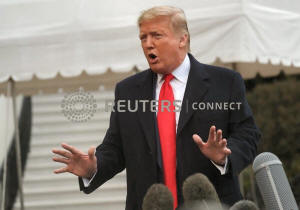Factbox: Trump impeachment - what happens next?
 Send a link to a friend
Send a link to a friend
 [January 14, 2020]
(Reuters) - The Democratic-led U.S.
House of Representatives is expected to send formal impeachment charges
against President Donald Trump to the Senate this week, where Majority
Leader Mitch McConnell has said he would help acquit his fellow
Republican at a trial. [January 14, 2020]
(Reuters) - The Democratic-led U.S.
House of Representatives is expected to send formal impeachment charges
against President Donald Trump to the Senate this week, where Majority
Leader Mitch McConnell has said he would help acquit his fellow
Republican at a trial.
Here is what can be expected in the coming days and weeks:
Jan. 14
House Speaker Nancy Pelosi will discuss next steps with rank-and-file
Democrats at a morning caucus meeting in the U.S. Capitol. The same
lawmakers, who represent the House majority, voted along party lines on
Dec. 18 to impeach Trump over his dealings with Ukraine.
Pelosi has already directed House Judiciary Committee Jerrold Nadler to
be ready to bring forward a resolution that would formally transmit the
charges against Trump to the Senate.
The measure would also appoint a number of House Democrats as
"managers," who would prosecute Trump in the Senate on charges that he
abused his power by pressuring Ukraine to investigate former Vice
President Joe Biden, a leading Democratic presidential contender for
2020, and that he obstructed efforts by Congress to uncover any
misconduct.

The House could vote on the resolution as soon as Tuesday.
Mid-January to late January
The exact timing of the trial will depend on when the House moves the
impeachment papers to the Senate.
The Senate would initially receive notification from the House that
managers have been appointed, according to impeachment procedures
adopted in 1986. The Senate would then adopt a resolution telling the
House when it is ready to receive the managers to present the charges,
known formally as articles of impeachment.
The House managers would then physically bring the articles of
impeachment into the well of the Senate and present them. The Senate
would inform the House when it is ready for the trial and organize for
the proceedings.
U.S. Chief Justice John Roberts would be sworn in to preside over the
trial. Senators would be sworn in as jurors.
House managers would present their case against Trump, and the
president's legal team would respond, with senators sitting as jurors.
Senators would then be given time to submit questions to each side.
[to top of second column]
|

President Donald Trump speaks to reporters as he departs for travel
to New Orleans, Louisiana from the South Lawn of the White House in
Washington, U.S., January 13, 2020. REUTERS/Leah Millis

Senators could also vote on whether to dismiss the charges against
Trump.
McConnell has said that, once the charges are formally submitted to
the Senate, he will back a resolution that would set initial rules
for the trial but postpone a decision on whether to hear from
witnesses.
McConnell has not yet published a draft of the resolution but he
said it would be “very similar” to one adopted in January 1999
during the impeachment of former President Bill Clinton.
That resolution set deadlines for the prosecution and defense to
submit “trial briefs” that laid out their cases in writing. The
resolution also allocated 24 hours for representatives of each side
to make oral arguments and set aside 16 hours for senators to ask
them questions.
The Clinton resolution referenced by McConnell did not resolve
whether witnesses would be called. A follow-up resolution allowing
for three witnesses to testify in videotaped depositions passed
later along a party-line vote.
Late January to early February
It is still possible congressional Democrats will succeed in their
push to hear from witnesses during the trial. If McConnell's
resolution on initial trial rules is adopted, as expected, senators
would likely vote after the trial has started on whether to
introduce witness testimony sought by the Democrats.
The Senate now has 53 Republicans, 45 Democrats and two independents
who usually vote with the Democrats. That means four Republicans
would need to cross party lines and join Democrats in requesting
witness testimony.
(Reporting by David Morgan, Jan Wolfe and Andy Sullivan; editing by
Ross Colvin and Grant McCool)
[© 2020 Thomson Reuters. All rights
reserved.] Copyright 2020 Reuters. All rights reserved. This material may not be published,
broadcast, rewritten or redistributed.
Thompson Reuters is solely responsible for this content.
 |